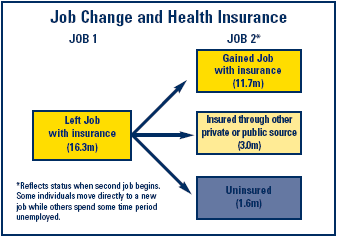|



The University of Michigan
555 South Forest Street
Third Floor
Ann Arbor, MI 48104-2531
T 734-936-9842
F 734-998-6341
/
|
 |
 |
Job Churning's Impact on Workplace Health Insurance
THE PROBLEM
The American economy is dynamic, with some companies growing while others downsize and workers moving in and out of jobs. In an economy where health insurance most often has ties to a job, a dynamic labor market implies changes in health insurance coverage. To date, little research has been done on how job changes impact health insurance coverage.
New research by economists Hanns Kuttner and Catherine McLaughlin from the Economic Research Initiative on the Uninsured (ERIU) finds job changers are less likely to have employer-sponsored health insurance in their own name. Only one of four job endings involves a worker with health insurance from the job left or lost. Furthermore, workers with job-based coverage tend to remain insured when they move from one job to another. Fewer than ten percent of those with coverage from their old job are uninsured at their next job.
Among uninsured adults, however, the most common reason for becoming uninsured is that they lost health insurance that came with a job. While only a small share of job endings lead to health insurance loss, job changes occur frequently enough to make this the leading reason why adults become uninsured.
|
|
Our heavy reliance on employment-based coverage leads to complicated interactions between labor and health insurance markets that are equally complicated for policymakers to fix. Most workers (3 out of 4) who move between jobs go from one job without health insurance to another job without coverage. But for those already covered, job loss or job change puts them at risk of losing coverage. Although the unemployment rate has moved up and back down over the last 35 years, according to Bureau of Labor Statistics data, the average unemployment duration has doubled, from 9 to 18 weeks. In 2005, 1 in 3 unemployed workers were unemployed for more than 15 weeks; 1 in 5 were unemployed more than 27 weeks. The loss of earnings, coupled with the longer duration, dilutes the effectiveness of COBRA for many workers. And going without coverage for that length of time increases the deleterious effects of neglecting treatment for chronic conditions and increases the probability of being without financial protection when injured or getting sick. Policymakers need to look anew at solutions that will work in our increasingly dynamic economy.
From Catherine McLaughlin,
Ph.D., Professor at the University of Michigan and Director of
ERIU |
THE FACTS
-
About one third of American workers, approximately 53 million individuals, change employers, become unemployed, or leave the workforce in any given year. Of those who change jobs, 75 percent go directly into another job, with the remainder experiencing an employment gap. Those currently unemployed have been without a job, on average, for five months.
-
Losing coverage that came with a job is the single largest explanation for how people become uninsured. Two-thirds of those without coverage became uninsured when they lost private coverage; more than half of those losing private coverage had coverage through their employer.
-
Younger workers are far more likely to change jobs and face health insurance changes. Workers between ages 21 and 30 make up 23% of the workforce overall but comprise 41% of workers who lose health insurance when leaving a job.

Q&A with Hanns Kuttner, M.A.
Hanns Kuttner, Senior Research Associate at the Economic Research Initiative on the Uninsured at the University of Michigan, focuses his research on labor and health insurance issues. Kuttner recently co-authored a paper, "The Joint Dynamics of Employment and Health Insurance," for ERIU.
Q: Your research shows people who change or lose jobs have a pretty high chance of losing health insurance for some period. How many people actually change or lose jobs in a given year?
A: About one-third of those who work during a year aren&apost at the same job the whole year. Among those who work all year, one-fifth change jobs during the year.
Q: How important is the labor market in determining why people become uninsured?
A: The American economy is dynamic. Employers have flexibility to change the number of people they employ. Workers leave jobs when their circumstances change and have a good chance of getting new jobs. The unemployment rate and other usual measures of the labor market capture the net effect of people moving between jobs, between employment and unemployment, or in and out of the labor force. Moving around can also have an effect on health insurance. When a job comes with health insurance, there's the potential for a health insurance transition, gaining or losing it. Because a majority of people with employment-based coverage have a dependent, one person&aposs job change can affect the coverage status of an entire family.
Q: What are the key findings of your research on the labor market&aposs impact on health insurance?
A: Thinking about people as falling into two categories, those with and without health insurance, misses a lot of the story. Some people who don&apost have insurance now are likely to get it from an employer in the future. It is important to consider how they will behave in response to some policy initiative. If a new policy makes them eligible for public coverage, will they take up employer coverage when they get offered that, or will they stay in the public program? If they stay, the program winds up costing more than you would have thought if you based your assessment on how many are without health insurance at a point in time. And if you base your assessment of how many people are uninsured by looking at the uninsured at a point in time, you leave out a lot of people who have health insurance now, but who will lose it and might wind up participating in the program you&aposve introduced.
Q: How long does the typical worker stay in a job? Do people stay in jobs with health insurance for longer periods?
A: Of the people who just start a job, about half will no longer hold that job two years later. If, instead, you focus on everyone who has a job now, the time period is much longer. About one-third of the workforce stays at the same job for four years or more. Other research has shown that someone who lands a job with health insurance can be expected to stay with the same employer for at least 12 years.
Q: Your work shows that of those who were always employed at the same job through the four years you examined, 12% lost their health insurance. How?
A: The most common story is that these individuals have coverage as dependents, most often as the spouse of someone else who had coverage, and when that person lost coverage, they, too, lost coverage.
Q: What is the implication of your work for policymakers?
A: The number of people who have coverage through employment includes millions who will lose it in the coming months. The hill is steeper than the number without health insurance implies. At the same time, six million adults without health insurance are likely to gain coverage through an employer over the coming year. The impact of any policy includes whatever impact the policy has on the ongoing process of people gaining and losing coverage.
|
UPCOMING
|
This Research Highlight is the 12th in a series of research-based policy documents that will address current questions and issues related to the health care coverage debate. For other ERIU Research Highlights and related documents, visit . |
Other ERIU Research Highlights

Back to top

Funded by The Robert Wood Johnson Foundation, ERIU is
a five-year program shedding new light on the causes and consequences
of lack of coverage, and the crucial role that health insurance plays
in
shaping the U.S. labor market. The Foundation does not endorse the findings
of this or other independent research projects.
|
